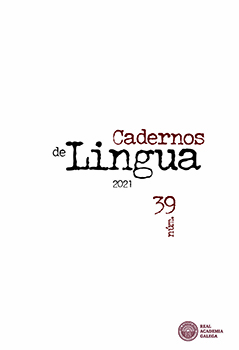Hi, Sir, can I have the book? Acquisition of politeness strategies in Galician language
DOI:
https://doi.org/10.32766/cdl.39.781Keywords:
politeness, request, pragmatic competence, childhood, Galician languageAbstract
Politeness is a key pragmatic competence for mastering a language and its acquisition is a process that begins in early childhood but it is not completed until adolescence. In addition, requests are one of the most demanding acts of politeness, since they pose a threat to the recipient, which leads to the need to use mechanisms to mitigate this threat, in order to preserve social relations and the proper development of the communicative exchange.
This work studies the process of acquiring the politeness strategies in the requests by Galician-speaking boys and girls, from the age of four to twelve. For this, we start from a fieldwork that allowed us to create a corpus of a total of 504 requests made by 21 informants divided into three different age groups. We analyse, from this corpus, which are the main politeness strategies used, as well as which variables seem to affect the use of one or other strategies and to what extent certain factors such as the age and sex of the informants.
Downloads
References
Bernicot, Josie (2006). L’acquisition du langage par l’enfant et la pragmatique : quand la parole est utile aux enfants. Le Langage et l’Homme. 41/2, 1-6.
Blum-Kulka, Shoshana (1987). Indirectness and politeness in requests: same or different? Journal of Pragmatics. 11, 131-146.
Blum-Kulka, Shoshana e House, Juliane (1989). Playing it safe: the role of conventionality in indirectness. En: Shoshana Blum-Kulka, J. House e Gabriele Kasper, eds. Cross-cultural Pragmatics: Requests and Apologies. Norwood: Ablex, 123-154.
Brown, Roger e Gilman, Albert (1972). Pronouns of power and solidarity. En: Pier Paolo Gigliogli, ed. Language and Social Context. Penguin: Harmondsworth, 252-282.
Brown, Penelope e Levinson, Stephen C. (1987). Politeness: some universals in language usage. Cambridge: University Press.
Carrasco Santana, Antonio (1999). Revisión y evaluación del modelo de cortesía de Brown & Levinson. Pragmalingüística. 7, 1-44.
Economidou-Kogetsidis, Maria (2010). Cross-cultural and situational variation in requesting behaviour: Perceptions of social situations and strategic usage of request patterns. Journal of Pragmatics. 42 (8), 2262-2281.
Ervin-Tripp, Susan, Guo, Jiansheng e Lampert, Martin (1990). Politeness and persuasion in children’s control acts. Journal of Pragmatics. 14, 307-331.
Escandell Vidal, M. Victoria (2005). La comunicación. Madrid: Gredos.
Félix-Bradesfer, J. César (2006). Linguistic politeness in Mexico: refusal strategies among male speakers of Mexican Spanish. Journal of Pragmatics. 38 (12), 2158-2187.
Fernández López, Xemma (2007-08). Estrategias lingüísticas para la mitigación de las peticiones en gallego. Pragmalingüística. 15-16, 84-111.
Fernández López, Xemma (2009). Interferencias pragmáticas: aproximación ás estratexias de cortesía nas peticións en galego. Revista Galega de Filoloxía. 10, 75-113.
Goffman, Erving (1967). Interaction ritual. Essays on face-to face behavior. New York: Anchor Books.
Gordon, D. e Ervin-Tripp, S. (1984). The Structure of Children’s Requests. En: Richard L Schiefelbusch e Joanne Pickar, eds. The acquisition of communicative competence. Baltimore: University Park Press, 295-321.
Grice, H. Paul (1975). Logic and conversation. En: Peter Cole e Jerry L Morgan, eds. Syntax and semantics. Vol. 3. Speech acts. New York: Chicago Linguistic Society, 41-58.
Matthews, Danielle, ed. (2014). Pragmatic development in first language acquisition. Amsterdam: John Benjamins.
Moreda Leirado, Marisa (2007). Os marcadores conversacionais como marca de cortesía no galego actual. En: Helena Chrystello e Chrys Chrystello, orgs. Galiza: Berço da Lusofonia: Atas do V Colóquio Anual de Lusofonia. Bragança: Arcos Online, 185-198.
Piccardi, Alice (2004). A retranca como acto lingüístico. Cadernos de lingua. 26, 99-108.
Solé Planas, María Rosa e Soler Vilageliu, Olga (2005). Las peticiones directas e indirectas en el habla infantil. Infancia y Aprendizaje. 28 (2), 159-178.
Solé Planas, María Rosa e Soler Vilageliu, Olga (2006). Requests in children from two different points of view. Le langage et l’Homme. 41/2, 81-100.
Wrubel Brants, Giovanna (2009). Aspectos da cortesía verbal no discurso infantil. Letra Magna. Revista Eletrônica de Divulgação Científica em Língua Portuguesa, Lingüística e Literatura. 11. [20/04/2016].


